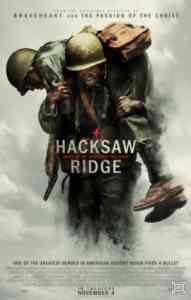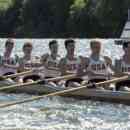Movie Review: Hacksaw Ridge
The Academy Award-winning director of Braveheart seeks career redemption in a war movie that grinds the gears of genre via a hero who refuses to carry a gun into battle
Hacksaw Ridge
3.5/5
Starring: Andrew Garfield, Sam Worthington, Luke Bracey, Teresa Palmer, Hugo Weaving, Rachel Griffiths, Vince Vaughn
Directed by: Mel Gibson
Running time: 138 minutes
Rating: Restricted
By Katherine Monk
Things haven’t been so swell for Mel of late. Bad press put him on the fringes of the entertainment industry for the past few years, forcing him to riff on villainy in trashy titles such as The Expendables 3 and Machete Kills.
The Academy Award-winning director of Braveheart needed commercial redemption, and just like a President looking to purge some public demons, he turns to that most reliable of public-opinion boosters: War.
Gibson sprinted his way into the public eye in Peter Weir’s tragic classic, Gallipoli. He announced his full arrival in the director’s chair with the bloody Braveheart, and now, he finds a new foothold in the Hollywood Hills with Hacksaw Ridge.
A Second World War movie with an American hero beating all the odds, this story set on the beaches of Okinawa in the final months of the conflict is nothing less than a tonic for the addled American soul.
It shows us brave U.S. soldiers putting themselves in harm’s way for a cause greater than themselves, but despite its familiar military swagger, this isn’t Clint Eastwood’s gung ho American Sniper.
Hacksaw Ridge tells the story of Desmond Doss, a patriot from Lynchburg, Virginia who enlisted to fight, but never picked up a gun. Doss was a Seventh Day Adventist, a sect of Protestantism that preaches non-violence and adheres strictly to the Ten Commandments. The army wanted to kick him out of boot camp, but Doss resisted the taunts and teasing. He cleaned toilets. He was beaten by his bunkmates, but eventually made it all the way to the war in the Pacific as an army medic in the 77th Infantry Division.
His life-defining moment came on Hacksaw Ridge, an escarpment on the beaches of Okinawa, where he saved the lives of his brothers in arms as well as those of the enemy.
Desmond Doss possesses every trait befitting an American hero, except for one. He is loyal, loving, brave and strong – but he does not like guns.
In the acid bath of current American politics, Gibson would seem to be making a passive-aggressive statement about the Second Amendment through a religious lens. Yet, at the same time, he’s fully embracing every war movie trope ever served up in the American canon of cannons.
It’s a strange paradox, but it fully embodies the existence and legacy of Desmond T. Doss, the first conscientious objector to earn the Medal of Honor. It also echoes some of the perceived character inconsistencies within Gibson, allowing the newly rehabilitated director an open playing field to purge his own soul in heroic form.
Now, given how much novelty is in play, and how much guns matter to the American psyche, you’d think Hacksaw Ridge would be darting through a minefield of suspense and surprise. Yet, just about every scene looks familiar, from basic training to the first taste of battle.
The only things that makes it feel different are the hero who refuses to kill, and Andrew Garfield, the actor who plays him. Garfield needed some redemption of his own after playing the web-slinging Spider-Man to underwhelming reviews, and you get the sense he’s working hard to earn our affection in the role of Doss.
Keeping a boyish grin on his face and his hands in his pockets, Garfield’s got an “aw-shucks” attitude throughout. Staring into his puppy dog eyes gets a little cloying at times, but it’s his hair that literally feels over-the-top: It looks like a forklift parked a hay bale on his head.
I know that’s incredibly petty.
And this is such an important movie with so much heart. It’s about War and Brotherhood and Faith in God. It’s about staying true to your beliefs regardless of the cost. It’s about love, and peace and turning the other cheek.
They are beautiful themes, but in Gibson’s world, they inevitably translate into graphic violence.
The battle scenes in Hacksaw Ridge are straight out of Saving Private Ryan’s first 20 minutes: body parts become confetti, bullets ricochet through flesh, bombs burst in human faces. You can’t argue with war, but there’s a sense of Gibson’s Braveheart-styled bloodlust that frames every scene, holding a primal – stifled – yell.
Throw Andrew Garfield’s spongemop of a screen presence in there, and the whole thing borders on absurd.
Seriously. There’s something palpably wonky about Hacksaw Ridge. It grinds the gears on the war movie genre machine by turning objectors into heroes and suggesting war is but human folly. In so doing, Gibson rearranges the carefully constructed emotional cues left in the wake of every John Wayne movie.
For this, he deserves a lot of credit, and no doubt an Oscar nomination. Hacksaw Ridge redeems the career, and perhaps the persona, of Mel Gibson. Yet, as a film unto itself, it never shimmies up to the bar of becoming a classic.
Garfield shows lots of emotion, but like much of the movie, it doesn’t always feel sincere. There’s something cool beneath the watery-eyed veneer. Despite the in-person interviews with real survivors at the end of the reel, it feels like a glossy pamphlet full of life-affirming hyperbole and a hint of condescension. It all feels a little simple, but it’s all part of the paradoxical gospel of Gibson, and one entertainer’s continuing search for salvation.
@katherinemonk
THE EX-PRESS, November 3, 2016
-30-






No Replies to "Hacksaw Ridge affirms Gospel of Gibson"